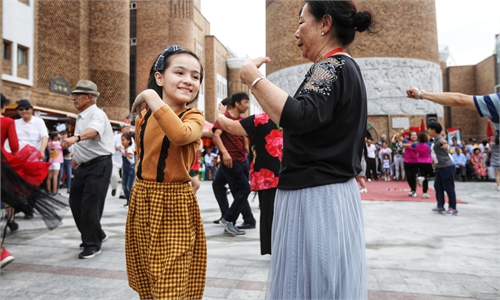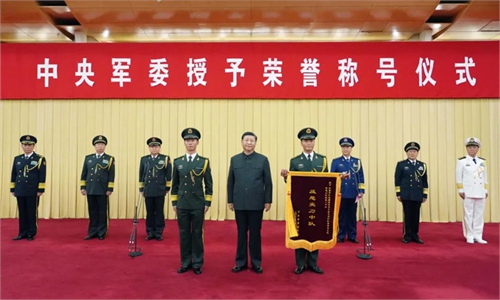Twelve years after the deadly July 5 riots in Urumqi, capital of Northwest China's Xinjiang Uygur Autonomous Region, victims and their families were invited to a memorial press briefing held in Beijing on Monday, which raised the alarm at a time when external forces are trying to send Xinjiang once again into a state of social unrest.
On July 5, 2009, highly violent crimes involving beating, smashing, looting and arson took place in Urumqi, which left 197 people dead and more than 1,700 injured. In total, 331 shops and 1,325 vehicles of various kinds were smashed or burned. Extremist and terrorist forces at home and abroad jointly planned and carried out these brutal violent crimes.
"Some innocent lives were lost in a moment, and some people's lives were changed, and we will always remember that evil, dark moment," Xu Guixiang, spokesperson of the Xinjiang regional government, said at Monday's press conference.
Violent terrorist activities, which violate citizens' human rights, endanger public security and undermine ethnic unity, must be severely cracked down on in accordance with the law to ensure that people live in a peaceful environment, Xu said.
Zhao Aiqin is the wife of a victim who was a bus driver in Urumqi. The bus driverwas seriously attacked by a mob on his way to work, leaving him with a lacerated upper lip, a collapsed nose and a blow to the brain, and all his front teeth missing.
"He used to love to talk and laugh, but he became taciturn after the incident… As a result of living in this environment for a long time, my youngest son also developed autism," Zhao said.
Sawutjan Sawur, a police officer in Urumqi, on Monday recalled an incident he experienced. "Around 8 pm [that day], we were suddenly attacked by hundreds of rioters, who also chased innocent members of the public along the road, and smashed and burned down shops along the street."
Sawur said that he and his colleagues formed a human wall to protect tourists and the public, but the mob broke through the defense line. Rioters pelted him with stones and bricks so hard that he fainted from bleeding and exhaustion.
"They [rioters] are the enemy of the people of all ethnic groups in Xinjiang, and they are also the enemy of our Uyghur people…" Sawur said. "Now we are living a stable life in Xinjiang, and we cherish today's life.".
Elijian Anayit, another spokesperson for the Xinjiang regional government, said that Xinjiang has had zero cases of violence and terrorism for four straight years, and the number of criminal and public security cases, including dangerous security incidents, has declined significantly. The infiltration of extremism has been effectively curbed.
After the July 5 riots, Xinjiang stepped up anti-terrorism and de-radicalization efforts, but some foreign media and the so-called think tanks claimed that there were "large-scale violations of human rights" in the process.
Practice has proved that cracking down on terrorism in accordance with the law, and ensuring the safety of the lives and property of people of all ethnic groups is the most fundamental protection of human rights, Anayit said.
"Do anti-China forces in the US and the West really care about human rights in Xinjiang? Are they really concerned about the real situation? Not at all," Xu said.
"Their fundamental aim is to use the so-called Xinjiang issue as a tool and 'protection of human rights' as a banner to undertake political manipulation, promote hegemony, attempt to undermine the stability and development of Xinjiang, and undermine the basic human rights of all ethnic groups in Xinjiang. This will once again send Xinjiang into frequent violent and terrorist activities and social unrest," Xu said.
They will further interfere in China's internal affairs and contain China's development. Such sinister intentions are clearly visible and disgusting, Xu said.




